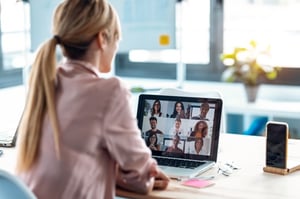COVID-19: Starting in Lockdown
 Coronavirus and its impact on the world will remain in our thoughts for many years to come. For me, it marked the beginning of a new chapter in my career, a role with Meaden & Moore, and returning to my roots in forensic accounting. I started in the middle of lockdown. For some, it’s the increased use of technology and the introduction of working from home that they will remember.
Coronavirus and its impact on the world will remain in our thoughts for many years to come. For me, it marked the beginning of a new chapter in my career, a role with Meaden & Moore, and returning to my roots in forensic accounting. I started in the middle of lockdown. For some, it’s the increased use of technology and the introduction of working from home that they will remember.
Almost 10 years ago, at an event organized by International Women of Excellence (IWE), author Alison Maitland gave a summary of her book, “Future Work: How Businesses Can Adapt and Thrive in the New World of Work.” She spoke of corporate cultures and management styles failing to keep pace with technological advances. She explained how remote working benefits the bottom line as well as the wider health of society and the environment.
Back then, a survey completed for the book revealed that over half the managers over 40 (and two-thirds of those under 40) said they had received no training for managing remote/flexible employees. Would this be any different today?
“The role of offices will shift from workplaces to meeting places,” Maitland said.
Those wise words have only now come to fruition, but it took an infectious disease and enforced lockdown to bring that change. The overall digitization within the industry has also been accelerated, but that is a topic in itself!
Suffice to say, if we embrace technology in dealing with processes and managing data, we can then add value in our interpretation of that data and use the information we create in the application of our experience.
One of the first things I did to embrace the change to virtual was to organize a live online panel discussion, Insurance and the Coronavirus – Shaping the Future. I am so grateful to the wonderful panelists, including:
- Julia Graham – Deputy CEO and Technical Director at AIRMIC
- Simon Sloane – International Arbitration Group Head & Partner at Fieldfisher
- Sarah Civil – UK Country Manager at Abaco International Loss Adjusters
- Jane Hayes – Underwriting Director at Lloyd’s Market Association
- Jane Kielty – Managing Director of UK retail at Aon
Video calls have become the norm. They have actually made colleagues and clients around the world feel closer, as previously we would have probably just spoken on the phone and rarely seen them in the flesh. So, although video calls are great for making our international friends feel closer, local colleagues and clients, who we are used to seeing in person, somehow seem further away and more distant, and a video call just doesn’t seem to cut it. But they are here to stay, and I love to see the intruders that occasionally appear and I welcome the slight informality that they have brought to our dealings.
The virtual world can make completely new business almost impossible, particularly in an industry that relies so much on personal relationships and trust. But technology has allowed business to continue, and actually allowed some professional services firms to increase productivity (as long as they have the benefit of a steady stream of work from existing long-term relationships). It has also shown that flexible working can be adopted successfully.
The working day has naturally become more flexible, as everyone is working from home where possible. One original benefit of flexible working (before COVID-19) was that it created a supportive environment to encourage females back to work. However, it actually created even more of a gender divide in the corporate world, as at that stage it had only really been taken up by working mothers.
The current restrictions mean that working from home is essential for everyone. It’s been a good leveller, and hopefully everyone will continue to embrace the benefits it brings, at some level at least.
Most people would probably prefer a balance. Training and development, and therefore the next generation of leaders, may see some negative impact. There is value in shadowing, plus mentoring and being monitored is essential to success. This is much more difficult to do remotely.
Does working from home allow the rising stars to shine? Also, not everyone is in the privileged position to have a study or spare room to work in. Being cooped up in a small space with limited human interaction could have long-term impacts. I will continue to appreciate extra time with my young family (a benefit of no commute), but as humans, we need more social interaction. We all miss a bit of office banter, and we all look forward to some normality returning.










